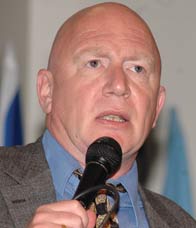|
Interview with Carlo Strenger on Midlife Crisis
February 2009 - By Dr. Nagendra V Chowdary
 Carlo Strenger
Carlo StrengerCarlo Strenger, Associate Professor at the psychology department of Tel Aviv University, a member of the institute of Existential Psychoanalysis, Zurich and of the Permanent Monitoring Panel on Terrorism of the World Federation of Scientist. 
Professor, you have been a psychoanalyst
and a philosopher doing research
in the area of psychology over
many years. What did this research
mean to you personally and how do
you think it would have impacted organizations?
Moving into midlife I felt that I
needed to renew myself. Even though
my career went great, my books were
in demand and my practice was
packed, I felt the need to develop further.
The idea to do more of the same
for the rest of my life was difficult to
accept.Hence I embarked on a search
for new activities, which I finally
found in shifting fromexclusive interest
in the individual psyche to issues
pertaining to society, culture and politics.
|
|
-
If you have to rank all your milestones
in this journey so far, what
would be the three interesting and insightful
milestones?
The firstmilestonewas the realization
in my early forties that being successful
in what you do may just not be
enough; you need to generate new
meaning to avoid burnout and a
sense of meaninglessness. The second
was the realization that my own
crisis was but another instance of
what is generally called the midlife
crisis and that I needed to see this as
an opportunity, and not just a problem.
The third was the understanding
that I needed to enlargemy field of
inquiry and study; that I needed to
address questions that are larger than
the individual. -
What prompted/triggered/fascinated
you to embrace this field of
study?
I had been actively interested in social
and political questions for many
years. Two events made me feel a
strong urge to get more actively involved.
One was 9/11, after which I
started to feel that the free world is
lacking the ideas to justify its way of
life, and that defending our lifestyle
through security measures is not
enough. The other was the breakdown
of the Oslo peace process between
Israel and the Palestinians.
Hence I felt that I needed to put more
emphasis on philosophy, which is
one of my two academic disciplines,
and to connect questions pertaining
to the individual to wider issues. We need to think deeply through the
question how we can protect our democracies
and human rights in the
face of the many threats democracy
experiences nowadays. We mustn’t
be pulled by terrorisminto totalitarian
measures, and we need to find ways
to defend our democracies both
physically and through our ideas. I
am sure Indian readers, living in the
world’s largest democracy, identify
with this goal as a matter of principle,
and even more so after the despicable
Mumbai Attacks. Finally we need to think about the
large scale issues that are at work in
world history nowadays. We need to
ask in what kind of society we want
to live in. In the midst of the current
worldwide financial crisis we need to
ask how business can play a more
constructive role in society. -
Congratulations to you (and your
co-author, Arie Ruttenberg) for having
authored a wonderful piece on
midlife crisis (“Existential Necessity
of Midlife Change”, HBR, February
2008). What is midlife and what are
its unique characteristics?
The basis of our “Existential Necessity
of Midlife Change” is the realization
that the increase in life-expectancy
is about to make midlife change
inevitable for most of us. The human
psyche is simply not built to do the
same thing for so many years. The second insight is that the idea of
retirement has become obsolete. It
was welcome in the early twentieth
century when most people did hard
physical work, but becomes a nightmare
for most in our time, when an
ever growing proportion of people.
Retirement has also become obsolete,
because most pension systems, public
and private can simply no longer
meet their obligations because of the
increase in life expectancy – a fact that
has become more dramatically obvious
through the present financial crisis. The third insight is that what makes
midlife change difficult is the fear of
losing the status and position that
we’re currently in. We focus on immediate
losses, and this makes it difficult
to see the long-termgain of initiating
change. Finally the fourth insight is that the
myth of magical transformation propounded
by popular psychology inhibits
rather than helps midlife
change. For most of us midlife change
will be evolutionary rather than revolutionary,
and hence we need to look
for evidence for our strengths rather
than give in to fantasies about a total
transformation that will fulfill all our
unrequited fantasies.
1.
Walt Disney's Corporate Governance Crisis Case Study
2. ICMR
Case Collection
3.
Case Study Volumes
|
